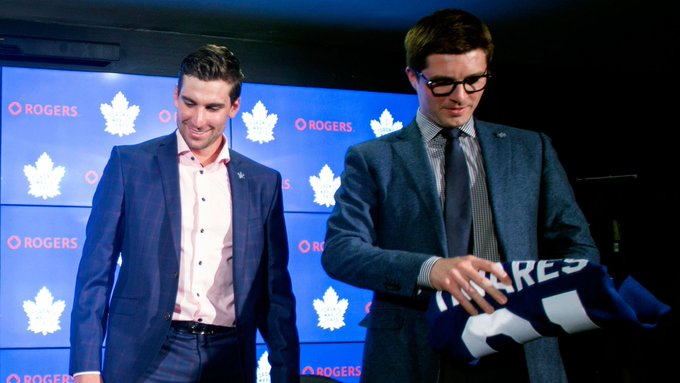The Toronto Maple Leafs salary cap mismanagement has become a problem. The Leafs have a core of key players that are the envy of many teams in the National Hockey League. They have the current Hart Trophy winner for league Most Valuable Player in Auston Matthews. He was also voted by his peers as the Ted Lindsay award winner. Not to mention his back-to-back Rocket Richard trophies. Mitch Marner, along with Matthews, was recognized on the NHL’s first all-star team this past season. They are supported by teammates such as perennial point a game player John Tavares, sniper William Nylander, and the smooth-skating, offensively talented Morgan Rielly. The problem? This team has limited options for improvement thanks to the salary cap mismanagement from general manager Kyle Dubas.
Dubas can’t be faulted for not being able to foresee diminishing league revenues thanks to a pandemic. However, he did not allow himself roster flexibility with the contracts he has handed out in recent years. As a result, Dubas has made his job more difficult in trying to upgrade a team that needs to take the next step. Without improvement, he is likely out of a job.
Stagnant Salary Cap Leaves Leafs With Few Options
Dubas signed Matthews to a new contract in 2019 with an average annual value of $11.6 million. The AAV is the third highest in the league. When that contract was signed, one could argue the AAV was too high. Now, coming off the season Matthews had, it’s hard to argue he is not worth that money.
In September of 2019, Dubas signed Marner to a new contract with an AAV at just under $11 million. Marner’s AAV ranks in the league’s top ten. For Marner’s production and consistency, this contract is very reasonable. Dubas was likely counting on an increase to the league’s salary cap when he signed his two key players to new deals. That was before the pandemic. The salary cap remained stagnant for three years. That, plus other Dubas mistakes, has left the Leafs in their current state.
Dubas Mistakes Have Contributed to Leafs’ Cap Issues
Last offseason Dubas signed goaltender Petr Mrazek to a three-year deal for $11.4 million, an AAV of $3.8 million. Dubas was hoping to add depth to push starter Jack Campbell. It would also provide security once Campbell became a free agent. Mrazek, however, struggled with injuries and inconsistent performance this past season. Now, the Leafs can only hope to find a trade partner to take Mrazek’s contract off their hands. The other option is to grit their teeth and hope Mrazek’s performance improves next season. There was no need for Dubas to sign Mrazek to that term or AAV.
The other, more controversial, error that Dubas made was the John Tavares free-agent contract. In 2018, near the beginning of the Matthews-Marner era, Tavares was signed to a seven-year, $77 million contract, with an AAV of $11 million. At the time, it made sense. A first step in helping move the Leafs into “contender” status. A proven second-line centre to help take some pressure off of Matthews and Marner. Tavares would provide leadership, fill a top 6 role, and help with faceoffs. In addition, a homegrown talent was returning to help the Leafs in their quest for a championship.
John Tavares on signing with Leafs via @OverDrive1050 with @HayesTSN, @GMillerTSN & @CarloColaiacovo: ‘It still doesn’t seem real.’ WATCH: https://t.co/JVziRrxwC2 pic.twitter.com/XY2fA8Odez
— TSN (@TSN_Sports) July 3, 2018
Four years into the deal and Tavares has done everything asked of him, until the second half of last season. His production dropped and rumblings started wondering if this was the beginning of a decline in his performance. His production is no longer a reflection of someone with a top ten AAV league-wide. Free-agent deals are almost always an overpay and there are still three years remaining on Tavares’ contract.
Lack of Hometown Discounts Also Hurting Leafs
When Dubas has signed key players to new deals he has been unable to convince them to take a “hometown discount”. In recent years, Atlantic division rivals the Boston Bruins and Tampa Bay Lightning have locked up important players to team-friendly contracts. Brad Marchand, Patrice Bergeron, Steven Stamkos, Brayden Point, Nikita Kucherov, and Victor Hedman were all signed to deals that have a lower AAV than the top 3 highest-paid players on the Leafs. Even lower roster players such as Nick Paul keep their demands reasonable.
Yes, Morgan Rielly, Mark Giordano, and Jason Spezza before them, signed team-friendly deals. Yet, Dubas has been unable to persuade his highest-paid players to lessen their contract earnings for the benefit of the team. Tampa Bay doesn’t have to deal with income tax and has nice weather. However, for a star player in a large market like Toronto, playing for the Leafs, there should be no shortage of opportunities to make extra money at the expense of some dollars from their contract.
Thanks to some of his previous mistakes, Dubas has a lot of work to do this summer. He has only himself to blame.






